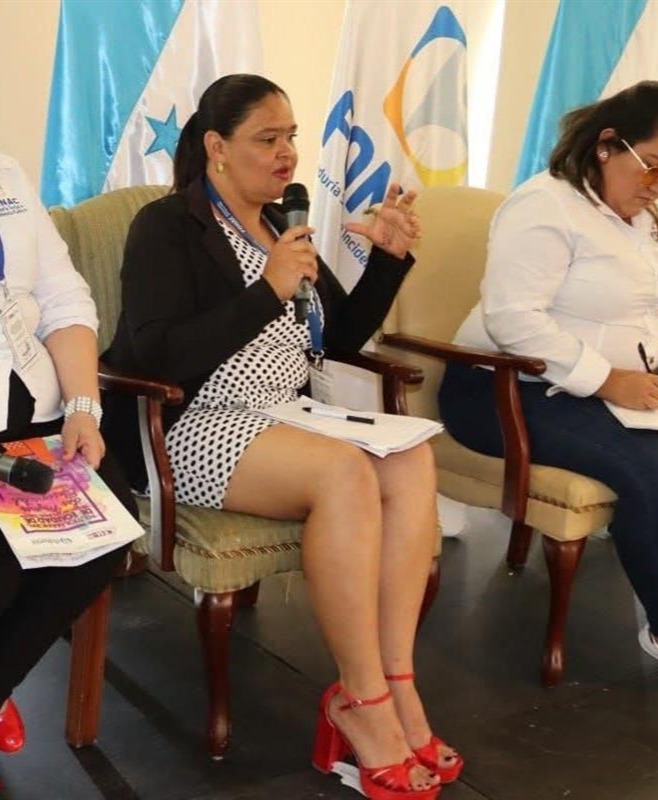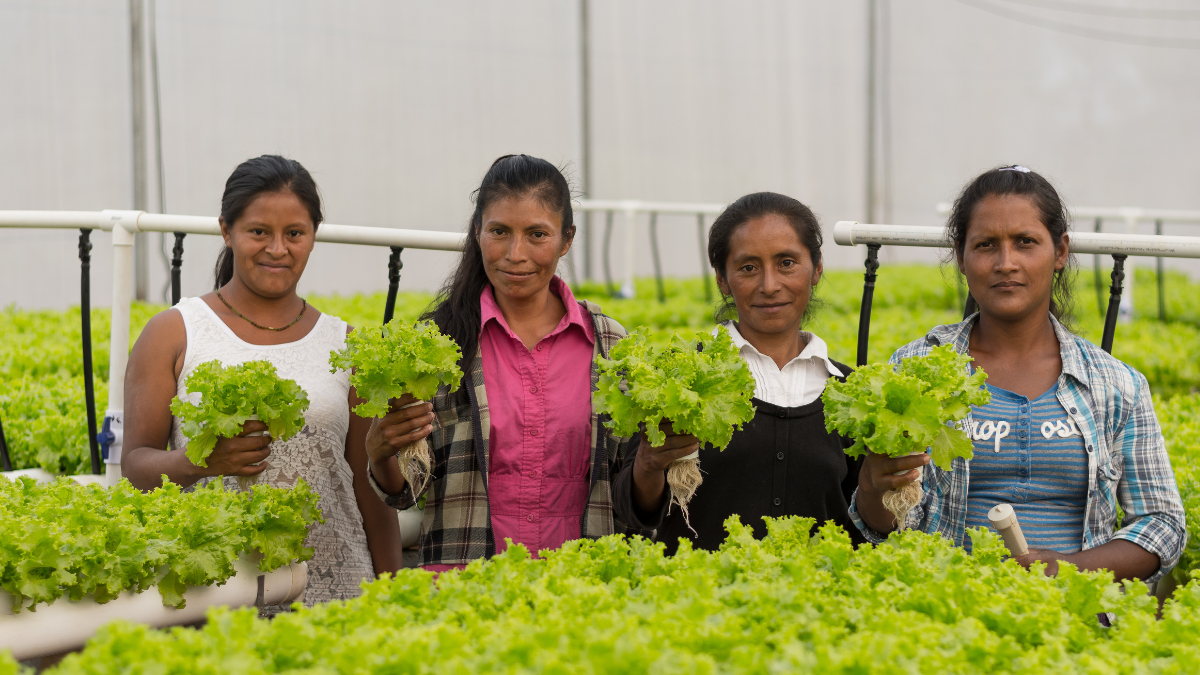This question, raised by a group of producers in Santa Bárbara, struck a chord with Raúl Pinel, Rikolto's project coordinator in Honduras. They weren't questioning the importance of the human right to adequate food - they were asking: Can we, as farmers, really exercise this right?
In a country where nearly half of the population lives in extreme poverty (INE1, 2024) and 1.8 million persons suffer from severe acute food insecurity2, it is urgent to implement and exercise the right to adequate food.
Through the People-Centred Food Systems Project3, Rikolto and its partners are working to better integrate human rights frameworks within local and national policies while fostering an understanding of the importance of food systems. Towards this, the initiative in Honduras aims to increase awareness, access to information and to strengthen the knowledge and capacities of rights-holders (including farmers, women, youth and people living with disabilities), civil society actors, and duty bearers such as policymakers and local organisations.
This article explores how Rikolto’s facilitation of multi-stakeholder and multi-level coordination is seeking to ensure that adequate food is no longer a privilege, but a right that protects the dignity of all.
.png)
A key early finding in the Central American country was the limited knowledge and application of international frameworks protecting the right to adequate food - even among government actors. In response, the project recognised that "training alone is not enough".
The efforts then focused on strengthening capacities, promoting effective multisectoral dialogue and embedding food systems, human rights approaches and equity in public agendas and policy frameworks.
Starting in 2022, Rikolto reinforced partnerships with the Technical Unit for Food and Nutrition Security (UTSAN) the University Observatory OBSAN4 and the National Human Rights Commission of Honduras (CONADEH). By 2023, five dialogue sessions were held with rights-holders, in which more than 196 persons participated. The conversations were guided to analyse the Honduran Agri-Food Policy (PESAH) and the National Policy and Strategy for Food and Nutrition Security (PyENSAN) to assess its alignment with the UN Declaration on the Rights of Peasants and Other People Working in Rural Areas (UNDROP).
Building on this, in 2024, Rikolto and the Honduran Secretariat for Human Rights (SEDH) started a collaboration and facilitated six more dialogue processes focusing on reviewing the new National Human Rights Policy. As a result, the right to adequate food was explicitly included — a significant achievement supported by the development of practical indicators to assess the progress in the implementation5.
Rikolto supported the validation of the indicators - which can be used to implement the UNDROP, PESAH and PyENSAN within the new Human Rights Policy.
.png)
In 2024, a food assessment was conducted with 125 community leaders, in collaboration with UTSAN, OBSAN6 and CONADEH. The study found that 47% of the participants were unable to consume three meals a day. Also, more than 60% did not eat the necessary quantity of fruit, and 70% did not eat the necessary quantity of vegetables. The full results are available here.
This data nurtured a community training plan rolled out later that year to promote the right to adequate food - including topics such as food security based on local resources, dietary diversity and sustainable production.
OBSAN used the results to organise workshops on food safety, while the Municipal Office for Women (OMM) integrated them into local health initiatives, focusing on women and children under five.

"In San Pedro, we face a high incidence of Chagas disease. It mainly affects women and children. Those affected need intensive treatment. And because we know more about their nutritional status - most of them are malnourished - we can provide them with adequate food so that they can receive their treatment in a better condition.”
In addition, the findings supported the Integrated Food Security Phase Classification (IPC) analysis in Honduras and helped to shape intervention priorities, particularly in La Paz.
While the project has made inroads at the national level, it is also promoting locally tailored solutions, particularly in the Dry Corridor - a region often associated with food insecurity issues. This includes departments such as Lempira, Intibucá, La Paz, Francisco Morazán, El Paraíso, Santa Bárbara, Ocotepeque and Choluteca. Here, the initiative collaborates with women from the Lenca Indigenous community within six of the eight municipalities part of the Association of Municipalities of the Central Region of La Paz (MAMCEPAZ).
Due to poverty, many Lenca men and young people have migrated in search of better opportunities, leaving women with responsibilities such as caring for children and the elderly. In addition to their domestic duties, Lenca women prepare meals in local schools and play a key role as community food stewards. Equipping them with nutrition and sustainable food practices is an integral part of improving public health, reducing diet-related diseases, and supporting long-term food security.
The Lenca people contribute to the resilience of the food system. Through their traditional knowledge, conservation of biodiversity, community governance and sustainable agricultural practices, they are resisting the onslaught of food insecurity. This is why Rikolto is working with families - especially women - to develop more nutritious, culturally appropriate diets using local ingredients based on the results of the food assessment. "In the long term," says Raul, "this could improve their nutritional intake - based on their cultural knowledge - and even boost the local economy.”
.png)
During the project, two major challenges stood out: first, establishing a direct coordination with government departments and managing their high staff turnover. It took nearly two years to formalise a working relationship with SEDH, that was made possible thanks to an earlier collaboration of Rikolto with the Ministry of Agriculture and Livestock (SAG) and CONADEH.
"A second challenge is that this is not a project that delivers inputs with short-term results. It is about influencing long-term behavioural change among farmers, indigenous people, and policy-shaping institutions. Impacts may take a decade or more to materialise,” explains Raúl Pinel, coordinator of the project in Honduras.
Even though Honduras has signed several international agreements on the subject, Raúl notes, "they are often not translated into workable regulations, especially at the local level. That is why it is so important to accompany the development and implementation of human rights policies. It is about promoting awareness, consistency and, ultimately, measurable change.”

Several recommendations have emerged from this experience:

Food is more than what ends up on our plates - it is a fundamental human right. Policymakers in other contexts can look to the Honduran case for lessons: realising this right requires cross-sectoral efforts that span agriculture, health, education, environment, and governance. That is why Rikolto focuses on collective action, trying to acknowledge the leadership of local communities and institutions - so that adequate food is no longer a privilege, but a right that protects the dignity of all.
The People-Centred Food Systems Project is led by the Columbia Climate School, the Alliance of Bioversity International and CIAT, the International Institute for Rural Reconstruction (IIRR) and Rikolto, and funded by the Swiss Agency for Development and Cooperation (SDC).
-----